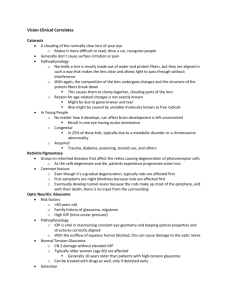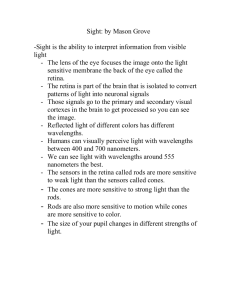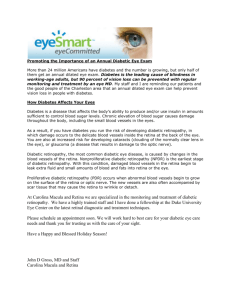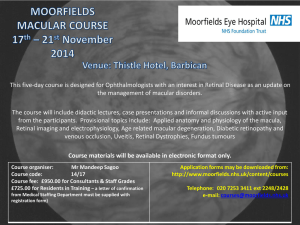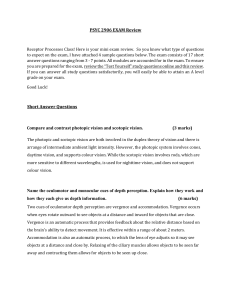Noctura 400 presentation
advertisement
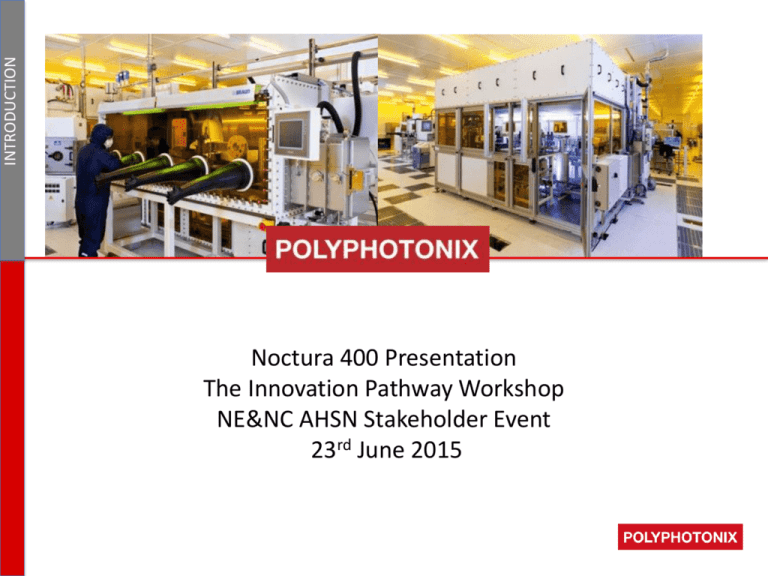
INTRODUCTION Noctura 400 Presentation The Innovation Pathway Workshop NE&NC AHSN Stakeholder Event 23rd June 2015 POLYPHOTONIX PolyPhotonix was established in 2009 Bio-Photonic Research and Development Company Expertise in Organic Chemistry, OLED and Printed Electronics Based at the National Centre for Printed Electronics at Sedgefield, County Durham we have used the CPI facilities as a incubation facility. NOCTURA PRODUCTS Diabetic Retinopathy:- Caused by changes in the blood vessels of the retina. New fragile blood vessels start to grow and often leak blood and fluid. Clinical trials complete and in progress, PILOT study in Primary Care, NICE MTEP pending. Wet Age Related Macular Degeneration:- Abnormal blood vessels behind the retina start to grow under the macula. These new blood vessels are very fragile and leak blood and fluid. Blindness can occur very quickly. Phase I/II in progress, further trials in planning. Dry Age Related Macular Degeneration:- Light-sensitive cells in the macula slowly break down, gradually blurring central vision and leading to blindness. There is no current treatment. Animal study completed, clinical trials planned. 3 NOCTURA 400 Noctura 400 Sleep Mask for Diabetic Retinopathy and Diabetic Macular Oedema • • • • Class IIa medical device with CE accreditation low cost, non invasive monitored ophthalmic therapy worn at night during normal hours of sleep 3 month disposable mask MECHANISM Structure of the Human Eye and Retinopathy Mechanism Rod & Cone Photoreceptors 120 million rods 7 million cones • Cones are used in good light conditions: Rods are used in low light conditions • 15 times as many Rods than Cones • During dark adaptation the oxygen requirement in the retina nearly doubles • Retina borders on hypoxia: Severe hypoxia if circulation is compromised. For a patient with diabetes:• Over production of VEGF chemicals which stimulate neo-vascular growth • Proliferation of blood vessels which physically obstruct vision • New blood vessels are weak and leak fluid - Macular Oedema How it works Noctura 400: • Low intensity light of specific wavelength • Rods are prevented from dark adapting • Oxygen demand of the retina remains at normal day time levels (60%) • Hypoxic responses avoided • Reduced retinopathy and macular oedema Versus Mesopic Response Comparison of Scotopic and Photopic Responses to Noctura 400 treatment • • • Photopic Response Curve outlines the general Light Adjusted (Cone) response to different wavelengths of light Scotopic Response Curve outlines the Dark Adjusted (Rod) response to different wavelengths As Diabetic Retinopathy is the primarily the result of rod metabolism, the Spectrum of the OLEDs should be appropriately tuned Wavelength Wavelength Photopic and Scotopic response curves Response of the retina to Noctura treatment CURRENT TREATMENTS Retinopathy Development and Treatments Noctura 400® • • • Prevents dark adaptation of the rods Breaks hypoxia cycle Low cost and non invasive Intra-Ocular Injection • • • Pan-retinal Photocoagulation • • • Highly invasive and expensive. Permanently damages photoreceptors. Continued treatment causes limited vision VEGF inhibitor High Cost to NHS Uncomfortable for patient The Pod and Compliance monitoring technology. COMPONENTS OLED Emitters Capacitive Sensor – ‘On’ Capacitive Sensors – Detect Face & Dose Delivered The mask works for 12 weeks. After which time it must be returned for data analysis. A replacement mask will be issued. COMPLIANCE Patient Compliance Data 12 Weeks CLINICAL VALIDATION Noctura 400 validation & evaluation process Completed 2015 2016/2017 Phase I 40 participants KTP & KTN Cell Biology - Safety INSIGHT - Phase II 60 participants >> > CZ Trial, 40 participants CANDLE – Current Care Pathway - NICE MTEP CLEOPATRA - Phase III, 15 Centers, 300 participants. Early stage DME PILOT – In Optometry DR/DME patients, within current care pathway CCG - Business Case – Service Improvement AHSN SUPPORT Support from AHSN and Partners NHS Innovations North Special interest GPs, Clinicians and CCG contacts, coding issues South Tees NHS FT CANDLE Trial site NIHR Clinical Research Network Links for other biophotonics projects NE &NC AHSN Newcastle Hospitals NHS FT City Hospitals Sunderland NHS FT CLEOPATRA Trial, AMD project, procurement process Finance and recharging landscape, access to clinicians BUSINESS CASE NHS opportunity for early adoption • Low risk medical device with CE mark • Cost savings compared with current treatments • 70% savings compared with laser treatment • 88% cheaper than intra-ocular injections • Step 1 - initial adoption opportunity • Prescribed and monitored in the Eye Hospital • Given in parallel with current treatments • Step 2 – future adoption to be considered earlier in care pathway Unit cost per treatment Unit cost with OPD follow up Units required per patient per year Cost per patient per year Laser £300 £420 6 £2,520 Injection £750 £820 8 £6,560 Noctura 400 Sleep Mask £125 £195 4 £780 THANK YOU Thank you www.noctura.com www.polyhotonix.com
